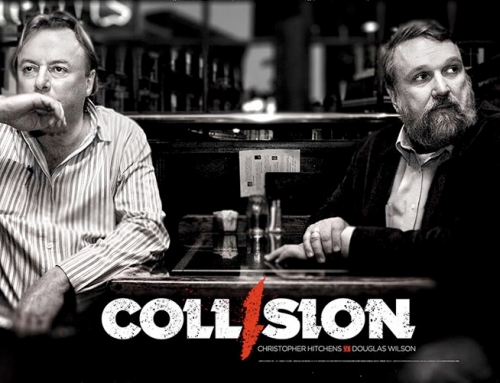Over the past decade I have participated in several debates over the question, Does the Universe Have a Purpose?, most recently in Puebla, Mexico in November, 2010, when Richard Dawkins, Matt Ridley, and I squared off (literally—in a boxing ring) against Rabbi David Wolpe and the theologians William Lane Craig and Douglas Geivett. The theists argued that without God the universe has no purpose, and they invested most of their time making the case for God’s existence through standard apologetics arguments: the Big Bang had to have a first-cause which is God, the fine-tuning of the universe for stars, planets, and life could only have come about by God, the intelligent design of living organisms is only accountable for by an Intelligent Designer, the existence of consciousness is a product of the conscious agent who created the universe, and the moral sense of right and wrong could only have come from a moral law giver.
None of these arguments are relevant to the question because, I contend, whether there is a God or not, the universe per se cannot have a purpose in any anthropomorphic sense for which that term is usually employed. The universe is simply the collection of galaxies, stars, planets, comets, meteorites and other solar system detritus, plus whatever dark matter and dark energy turn out to be. The universe is governed by laws of nature that themselves have no purpose other than what they inevitably dictate matter and energy to do. Stars, for example, convert hydrogen into helium, and they have no choice in the matter once they reach a certain size and temperature. Stars are not sitting around thinking “my purpose in life is to convert hydrogen into helium so I better get on with it.” Ditto everything else in the universe, including all living organisms, from C. elegans to H. sapiens.
Life began with the most basic purpose of all: survival and reproduction. For 3.5 billion years organisms have survived and reproduced in a lineal descent from the pre-Cambrian to us, an unbroken continuity that has endured countless terrestrial and extraterrestrial assaults and six mass extinctions. This fact alone ennobles us with a sense of cosmic purpose, but add to it the innumerable evolutionary steps from bacteria to big brains, and the countless points along the journey in which our lineage could have easily been erased, and we arrive at the conclusion that we are a glorious contingency in the history of life. As Charles Darwin wrote in the penultimate paragraph of his 1859 masterpiece On the Origin of Species: “When I view all beings not as special creations, but as the lineal descendants of some few beings which lived long before the first bed of the Silurian system was deposited, they seem to me to become ennobled.”
Humans have an evolved sense of purpose—a psychological desire to accomplish a goal—that developed out of behaviors that were selected for because they were good for the individual or for the group. Although cultures may differ on what behaviors are defined as purposeful, the desire to behave in purposeful ways is an evolved trait. Purpose is in our nature. With brains big enough to discover and define purpose in symbolic ways inconceivable to billions of preceding and co-existing species, humans stand apart as genuinely unique in our attention to purposeful behavior. Evolution gave us a purpose driven life.
How we define our purpose-driven lives may be personal, but there is an inherent structure to the human condition that helps delimit our search. Humans have evolved as a social primate species with a hierarchy of needs depicted in the diagram below, in which individuals belong to families, families to extended families, extended families to communities, communities to societies, and most perceiving societies as part of the species, and the species as part of the biosphere.

Hierarchy of Needs
At the bottom of the pyramid the individual’s purposeful needs for survival and reproduction—food, drink, safety, and sex—are met through the family, extended family, and community. Moving up the pyramid, psycho-social needs—security, bonding, socialization, affiliation, acceptance, and affection—have evolved to aid and reinforce cooperation and altruism, traits that benefit both individuals and the group.
Selfish genes drive kin altruism (the propensity to help those who are genetically related to us), and social relations fuel reciprocal altruism (if you’ll scratch my back I’ll scratch yours); but to achieve species- and bio-altruism, we need to learn higher-order pro-social behavior. Achieving the upper levels of the pyramid requires social and political action. We evolved in a manner in which our concern for the environment and biodiversity was restricted to a few tens of square kilometers, a couple of hundred of species, and a handful of decades. Global ecology and deep time were beyond anyone’s conception until the past half millennium, which is too short a time for evolution to fundamentally expand the range of our purposeful concerns. Higher purposes are learned and volitionally practiced.
What type of purpose should we practice? Although there are countless activities people engage in to feel purposeful, social scientists have discovered that there are a handful of powerful means by which we can bootstrap ourselves toward higher goals that have proven to be especially beneficial to both individuals and society. These include:
- Deep love and family commitment—the bonding and attachment to others increases one’s circle of sentiments, and corresponding sense of purpose to care about others as much as, if not more than, oneself.
- Meaningful work and career—the sense of purpose derived from discovering one’s passion for work drives people to achieve goals so far beyond the needs of themselves that they lift all of us to a higher plane, either directly through the derivatives of the work itself, or indirectly through inspiration and role modeling.
- Social and political involvement—as a social species we have an obligation to community and society to participate in the process of determining how best we should live together.
- Transcendency and spirituality—a capacity unique to our species that includes aesthetic appreciation, spiritual reflection, and transcendent contemplation through a variety of expressions such as art, music, dance, exercise, meditation, prayer, quiet contemplation, and religious revere, connecting us on the deepest level with that which is outside of ourselves.
Evolution created in us a basic drive of purpose, but higher moral purposes are learned. To reach the highest levels of moral purpose that concern society, the species, and the biosphere, and especially with people who are not related to us, are not in our social group, belong to other groups on other continents whom we shall never meet, requires volitional action and a social conscience. As one of the great consciousness raisers of the twentieth century, Helen Keller, wrote in a 1933 Home Magazine article entitled “The Simplest Way to be Happy”:
I know no study that will take you nearer the way to happiness than the study of nature—and I include in the study of nature not only things and their forces, but also mankind and their ways, and the moulding of the affections and the will into an earnest desire not only to be happy, but to create happiness. It all comes to this: the simplest way to be happy is to do good.
In our debate in Mexico I ended my talk by asking both the theists on the other side of the ring and the audience as a whole to try being an atheist for just an hour or two to see how it feels, and to ask themselves what would change if they stopped believing. Would you lose all purpose in life? Would you quit work? Would you stop being nice to other people? Would you cease loving your spouse, supporting your family, interacting with your extended family, contributing to your community, or participating in your society? Would you abandon all activities that lead to a sense of transcendency and spirituality? Of course not! Shouldn’t you we love our families, be nice to other people, and support our communities because those things are good in and of themselves? Of course!
Whether there is a God or not all of these purposeful activities—and many more—stand as ends in themselves in the hear-and-now, not as means to some other end in the hear after. Purpose is not some prop on a momentary stage before an eternal tomorrow where its ultimate meaning will be revealed to us. Purpose is created by us through the courage of our convictions and the honor of our actions.



Mike you’re a nice guy, but i think there are many plugs in our thinking. Relying completely on evolution for our individual personal lives can actually create mass murderers and tyrants. We must lead our personal lives, our goals, meanings beliefs and opinions regarding our individual lives from the vantage point of a self or individual only. Only Evolution brings in to our self an idea that oh it actually doesn’t matter if I do something to the grand scheme of evolution…
I as a pantheist believe that this life is the only we’ve got and the only possible chance to experience God till we are reduced into non existence. We should enjoy it, and be thankful.